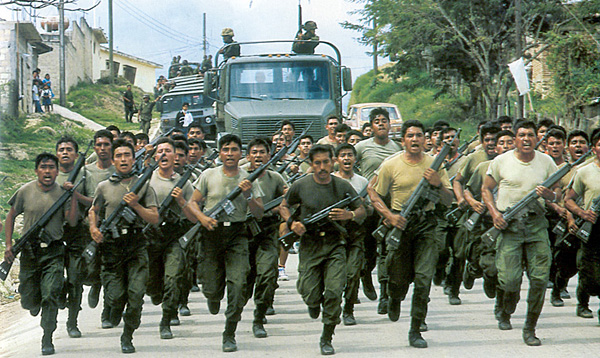
|  |  |  Americas & Beyond Americas & Beyond  
Mexican Agents Trained in U.S. to Fight Drug Gangs
 Harriet McLeod - Reuters Harriet McLeod - Reuters
go to original
October 25, 2010


| | (SodaHead) |  |
North Charleston, South Carolina - Twenty-four Mexican customs agents completed a 10-week training course in South Carolina on Friday, the first of hundreds expected to get the same training U.S. agents receive to bolster the fight against powerful drug gangs.

Drug smuggling into the United States by Mexican-based gangs and related deadly violence on both sides of the border are major challenges and issues for politicians and officials in the two countries.

"These guys are a new generation of Mexican officials that have strong values and will be committed to fight crime in Mexico," said Mexican Treasury Secretary Ernesto Cordero Arroyo, at the graduation ceremony at the U.S. Immigration and Customs Enforcement Academy (ICE) in North Charleston.

"I'm sure that right now they are the most qualified officials that we have ... All the technical capabilities that they have built here are very valuable to us, and certainly (this training) couldn't be done in Mexico," he said.

"Hopefully, this will continue for several years. We have a long line of officials in Mexico waiting to be trained," Cordero added.

Department of Homeland Security Secretary Janet Napolitano and John Morton, director of U.S. Immigration and Customs Enforcement, also attended the graduation ceremony, where officials said the training program would help combat the drug war along the porous nearly 2,000-mile (3,220-km) U.S.-Mexico frontier.

U.S. President Barack Obama authorized the deployment of 1,200 National Guard troops along the border in May to stop smugglers and migrants trying to cross illegally.

Mexican President Felipe Calderon has staked his reputation on beating back powerful drug cartels in a military-led campaign he launched in December 2006.

He is under pressure to show his drug war is working as the death toll over the past four years climbs to nearly 30,000 people, putting Washington and foreign investors on edge and provoking alarm among many Mexicans.

"A CROSS-BORDER CHALLENGE"

"It is a cross-border challenge," ICE Director Morton said on Friday. "It's all about the illegal movement of people, money, guns, drugs. The way the laws are written in both countries, customs powers are at the forefront of that fight."

Morton said ICE was open to training customs officials from other countries. But he said the focus was on making progress in the joint U.S.-Mexico crime fight and that was why the 24 men and women from Mexico were the first to receive the same training U.S. agents receive.

"The only way we are really going to make some headway against the organized criminals that are abusing laws in both countries at the same time is through trainings like this. Literally, hundreds (of Mexican agents) will be trained here," Morton said.

While Washington is giving Mexico $1.3 billion in anti-drug equipment and training via the so-called Merida Initiative, analysts say Mexico must do more to go after the cartels' cash to weaken the gangs. Even well-trained Mexican agents are at risk of being corrupted by the sheer wealth of drug gangs that earn up to $40 billion a year.

Many agents are poorly paid and training programs have backfired in the past. In the late 1990s, about 40 U.S.-trained Mexican elite soldiers went to work for Mexico's powerful Gulf Cartel and have since formed their own gang, the Zetas, which is one of Mexico's most ruthless outfits.

Disgraced former Mexican drug czar General Jesus Gutierrez, who in the 1990s worked closely with U.S. officials, was discovered in February 1997 to be working for drugs traffickers. Mexico has dismantled top anti-drug police and customs units several times over the past decade to launch new organizations of trusted agents, only to find that corruption again weakens institutions aimed at combating the drug trade.

(Additional reporting by Robin Emmott in Mexico City; Editing by Tom Brown and Jerry Norton)
|

 |
|  |



